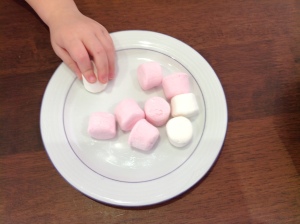Recently I met up with some teacher friends and, as always happens with teachers, the discussion turned to school, teaching and children. There was talk about the crowdedness and inappropriateness of many aspects of the curriculum, of resources that were ambiguous and poorly written, of time spent practising and preparing for tests, of (other) teachers who were ill-equipped to teach and not interested in professional learning.
It made me sad. It has always made me sad. Sad and frustrated with the inappropriateness of so much that happens in schools and the effect it has on diminishing our most precious resource: the ability to think, learn, innovate and create.
The fact that I am unable to do anything about this situation at times overwhelms me and I just want to curl up in a ball in the corner and cry. That I have spent almost my entire adult life swimming against the tide trying, through a variety of means, to make a positive difference through education with an effect as insignificant as a grain of salt in the ocean, makes my efforts seem futile and worthless. A waste of time and energy. I should just give up.
But, foolishly maybe, I haven’t and don’t. Here I am writing a blog about education. One more way to try; with a website on the way as well. What effect will they have? Probably very little, but at least I am doing something that is important to me; something that gives my life meaning; even if it has no real value beyond that.
I have been out of the classroom now for three years. I escaped before the introduction of new programs which I would have found philosophically and pedagogically impossible to implement. It had always been a balancing act, doing what my employer expected of me and what I believed to be best for the children and their learning. (Of course there is no saying that what I thought was better. The value of my thinking may well have been just in my head!)
Five times before I had left the classroom, only twice for reasons unrelated to dissatisfaction (the birth of children). But I could never shake off my belief that education delivery could be improved. I read widely, seeking alternative ways of making a positive difference but, although I had vowed at each departure to never return, something always drew me back.
Rather than allowing the situation to overwhelm me by accepting that there was nothing I could do; rather than throwing my hands in the air, walking away and admitting that it’s all too hard, I didn’t let go. Perhaps it was foolhardy. Maybe I should. Maybe one day I will. But not yet.
Instead I choose to focus on the good things I see happening; the parents, teachers, nannies and child care workers who strive to make a positive difference. We know we can’t change the whole world. We can’t rid it of all the injustices, inequalities, violence and other wrongdoings against humanity and the Earth. But we can make a difference in our own little corner; and my own little corner has always been my focus. If I can make a difference with something as simple as a smile or sharing a positive thought then I will do it. If I can do more than that then I will, but I will focus on what I can rather than what I can’t.
So for my little bit of positivity today, I am sharing some of what I think are great things that are happening, making a positive contribution to education and children’s lives; some things that make my heart sing and confirm my belief that if we want to, we can make a difference.
I have previously shared some thoughts that stimulated great discussion about the famous Marshmallow Test conducted by Professor Walter Mischel.
On All Our Words I recently read a report of an address made by Mischel to the team at All Our Kin.
In that address, Mischel is quoted as saying,
“When a child grows up in a high-poverty, extremely unpredictable environment – in which anything can happen, in which danger is constantly present, in which chaos is always possible – it affects him at a biological level. Those experiences turn into chronic stress, or toxic stress, and they actually change his brain. They limit the potential of the cool system to make long-term plans and be patient and work for a distant goal.”
The author of the article, Christina Nelson writes
“Fighting against the biology of disadvantage requires a sustained effort that begins at birth, or even earlier, which is why creating high quality early care and education is so important for vulnerable children.”
Mischel’s address further supports that view and congratulates the team at All our Kin for their work, saying
“By providing a sense of trust, a sense that the rewards are attainable, that promises will be kept, that life doesn’t have to be chaotic and unpredictable, you folks are providing exactly the basis for the development of the cool system, and for the regulation of the hot system. The kids who have that when they are two years old are the same kids who are successful at the marshmallow test at five.”
The praise from Mischel would not have been given lightly. I’m impressed with what I have read about All Our Kin, including this from their mission statement:
“. . . children, regardless of where they live, their racial or ethnic background, or how much money their parents earn, will begin their lives with all the advantages, tools, and experiences that we, as a society, are capable of giving them.”
The Talking is Teaching program, which was launched by Hillary Clinton as part of the Too Small to Fail initiative, in Oakland aims to reduce educational (and life) disadvantages by teaching parents the importance of talking to their children from birth.
Thanks to my friend Anne Goodwin and daughter Bec I was also alerted to an article in the New Yorker The Talking Cure which described a program in Providence that also encourages low-income parents to talk more with their children.
The author of the article, Margaret Talbot says that “The way you converse with your child is one of the most intimate aspects of parenting, shaped both by your personality and by cultural habits so deep that they can feel automatic. Changing how low-income parents interact with their children is a delicate matter”. The aim of the program is to support parents in non-threatening ways to support their children.
I have previously mentioned a recent publication by Michael Rosen entitled Good Ideas: How to Be Your Child’s (and Your Own) Best Teacher. This book provides wonderful support for parents of children of any age. In very readable, accessible language, Rosen’s book is packed full of simple, inexpensive, fun and powerful ways for parents to support their children’s learning, effectively but unobtrusively, in their everyday lives. I think this book should be supplied to all parents on the birth of their children.
Closer to home here in Australia are Community Hubs and other programs such as Learning for Life run by the Smith Family and Acting Early, Changing Lives by the Benevolent Society.
These are but a few of the good things that are happening. I have focussed on community programs rather than individuals (except for Michael Rosen’s book) in this post. I know there are many more great programs, and individual teachers doing amazing work. I’d love to hear about some that you admire.
Thank you for reading. I value your feedback. Please share your thoughts about any aspect of this post.







Norah, your passion is so directly connected to your heart, it makes it nearly impossible to give up on it, even when you come close. Do what makes you feel good about how you spend your life. And even if you don’t always see the differences you make in the short term, there are usually long term effects AND many positive things that happen because of what you do that you are simply never privy to. And though I’m not necessarily a Hillary fan, I loved that video. Thanks for sharing all of this 🙂 Stick with what you know is best.
LikeLiked by 2 people
Thanks Donna. I really appreciate your support and advice. I can’t change who I am. Education is my consuming interest (outside my family). 🙂
LikeLiked by 1 person
I am not a teacher but I volunteered in the school system where my children attended for twenty-five years, often working at the district, high school, middle school, and elementary levels at the same time. My goal was to do whatever I could to have a positive impact on the education of not only my children, but on all the children in the community. I think I accomplished that.
Kudos to you Norah, for your efforts as a teacher and for your continuing work to improve education.
LikeLiked by 2 people
Hi Michelle, Thanks for your support and joining in the conversation. Congratulations on becoming involved in the school where your children attended. Twenty-five years is a mighty effort and would have been greatly appreciated by your children, their peers and the teaching staff. Undoubtedly your efforts would have had a powerful and positive impact on the education and futures of so many whose lives you touched. I was always extremely appreciative of parents who helped out in my classroom. The value they added to my program and the learning of the children was immeasurable.
LikeLiked by 1 person
Fascinating post and post discussion between the three of you experts (in your various fields). As a man whose legal career was directly involved in putting millions into millionaires pockets (sorry Anne) until I managed to persuade the powers that be to embrace a wider remit, I feel reluctant to say too much beyond echoing the sense of loss you all feel at the frustrations inherent in pushing rocks uphill. It may be the time has indeed come for you to address your concerns differently. Possibly you need to write the novel that centres on the sort of teacher you see weighed down by these issues and how they might go about fighting the odds. You clearly have the writing talent, you know you have the knowledge and context and you have a supportive community around you wanting you to pull it out. What’s holding you back?!! 🙂
LikeLiked by 2 people
Imagination!!!!!
LikeLiked by 1 person
Hi Geoff,
Thanks for your supportive and encouraging comment. I guess you are right. I should stop pushing my barrow and try to look at things from another viewpoint. I will give some thought to that and see how I go. No promises yet though!
LikeLiked by 1 person
If I can , you can…
LikeLike
No always true . . . 🙂
LikeLiked by 1 person
I can identify with a lot of what you say from my own experience of working in a different sector of human services. It’s so sad seeing how progressive initiatives in health and education are being lost so that we can put more into the pockets of millionaires. In Britain, there was a very helpful early years project called Sure Start, now savagely cut back. To my mind, it’s false economy. It’s not just an education issue but those first three years are crucial for the future mental well-being.
It’s great that you’re able to maintain your passion and keep fighting your corner. But, don’t forget, swimming against the tide is exhausting work and there’d be no shame in stepping aside if/when this is what you want to do and letting the next generation carry the banner.
LikeLiked by 1 person
Thanks again, Anne, and for your suggestions re my mental health. Maybe I should listen to someone trained, and knowledgeable in the field! 🙂 I guess I’m easing my way out. The longer I am out of the classroom the less influence my voice will have. Maybe my blog will have to do, and I can turn my focus back to fiction and poetry (and maybe a bit more reading of same)! We’ll see. No guarantees. Yet. Ever?
LikeLiked by 1 person
I don’t think that your voice will have less influence the longer you are out of the classroom. You have such a passion for this topic. Maybe it’s just a matter of taking it in a different direction. ?
Fiction and poetry are good, too. 🙂
LikeLiked by 2 people
Thank you for your support and suggestions, Sarah. I’ll give them some consideration. 🙂
LikeLike
Hi Nor, great post as always. This reminded me I read an article on Pacific Standard about the obsession with ranking in education (it is about the US system, but perhaps has some lessons for we folk not in the US too). Here’s the link: http://www.psmag.com/navigation/books-and-culture/big-sort-obsession-american-education-ranking-people-95455/
It is a shame that our education system manages to infuriate, alienate, and eventually lose teachers such as yourself who are impassioned and dedicated. I would like to hope for change, but can’t see how it will happen outside of a growth in “alternative” schools. But even then, I imagine there are some demographic trends which may suggest there are particular families who would be making that choice, maybe those whose children are not like the children you describe in your post. But as always you rightly point out the good things happening; the community hubs and so on.
There was a fascinating radio show – perhaps it was on Big Ideas? – a seminar discussing alternative education. Apparently there was some initiative that Bill Gates used for his children even though it was directed at offering some assistance to less fortunate kids. The speaker said that after the endorsement of, and use by, Bill Gates, there was a lot more enthusiasm for the program because the parents from poorer backgrounds perceived that this was A Good Thing To Do, because wealthy people who had a choice about it were doing it, rather than something that was sub par and just pushed on poorer folks. I’ll do some digging and see if I can find the link – I think you would enjoy it!
LikeLiked by 2 people
Hmm, I can’t find the podcast I’m thinking of (from memory it was a TED-style talk on new modes for education), but it looks like the subject might have been the ‘Kahn Academy’ based on what I can remember during the discussion. It’s a bit outside of what you have been discussing – online maths tutorials given by a proficient teacher. Here’s a link to a story about it: http://abcnews.go.com/WN/khan-academys-online-videos-teach-struggling-students-globe/story?id=11577873
LikeLiked by 1 person
Thanks Bec. I’ll check that one out too. I am familiar with the Kahn Academy. I did watch a TED talk by the founder, Salman Kahn, a couple of years ago. He started off making videos for his nephews, if I remember correctly, and it grew from there. It’s a pretty amazing ambition and achievement.
LikeLike
That’s a good point about the Bill Gates endorsement, Bec. One of the difficulties sometimes with these kinds of programmes is that they’re directed at the less affluent. It makes sense, if resources are scarce to target them towards groups that run the risk of being doubly disadvantaged, but then the services can be stigmatised and thereby less sustainable. I liked the video with Hilary Clinton showing more affluent looking homes as these are initiatives that are useful for everyone.
LikeLiked by 1 person
I appreciate your comment about the stigma. It is certainly something that one needs to be mindful of and accountable for. No point in hitting someone when they are down. Better to offer a hand up. I wasn’t aware of Hillary Clinton as anyone other than the First Lady until I listened to her read one of her books last year (I think she read it). I was very impressed by the way she proactively advocates for women and children, particularly those who are disadvantaged.
LikeLike
Hi Bec, Thanks for your supportive comment and furthering the discussion, including suggestions of further things to follow up. I’m not sure that I want to read any more about the obsession with ranking (don’t worry it is happening here too). I think it might be easier to stay positive if I put my head in the sand. I will read it, though, you know that. I always, mostly, usually follow up on your suggestions. I forgot to tell you that I was pleased to listen to and read the lyrics of Black Hole Sun. I don’t mind learning stuff I didn’t know. Heavens! There’s heaps of that. I need to reduce my information disadvantage!
I know what you mean about things being pushed at people and making them feel sub par. It would be terrible if these programs did that and reinforced the cycle of disadvantage. I do think it takes some finesse and sensitivity to have it implemented correctly. Support and encouragement and a sense of value, rather than condemnation and blame.
LikeLike